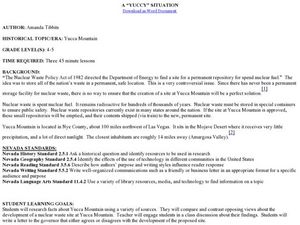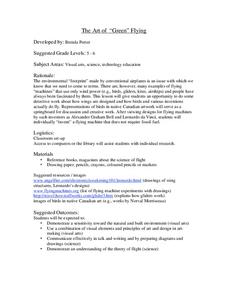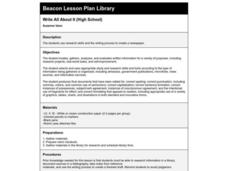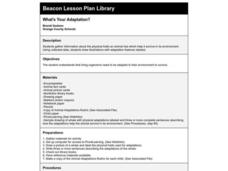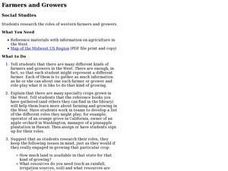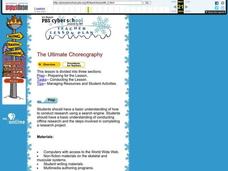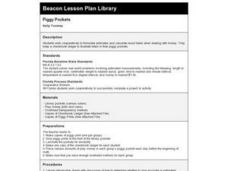Curated OER
A Yuccy Situation
Young scholars examine the concept of nuclear waste storage. In this interdisciplinary lesson, students research Yucca Mountain in order to compare and contrast opposing views regarding the nuclear waste site there. Young scholars...
Curated OER
Those Amazing Animals
Learners understand the roles of animals in entertainment and sports. In this animal welfare lesson, students recognize that some animals are used humanely and others are used cruelly. Learners classify different animals into the lists...
Curated OER
Shark Food
Young scholars create a linking chain to demonstrate the food chain. In this food chain lesson, students use the Internet to research sharks, including what they eat, and create a chain link with a picture of a shark. They...
Curated OER
Writing Novelettes
Students practice their writing techniques by creating a novelette. In this creating writing lesson, students brainstorm and decide on a topic they would like to expand upon in order to create their own novelette. Students...
Curated OER
The Art of "Green" Flying
Students create an airship that doesn't use fossil fuel. In this flying lesson plan, students research different types of flying machines that only use wind power. They discuss invention designs by Alexander Graham Bell and Leonardo Da...
Curated OER
Our Solar System
Sixth graders use the internet to examine the different bodies in space. In groups, they select one project they want to complete and are given a timeline for when the sections are due. To end the lesson, they present their information...
Curated OER
Unearthing The Facts
Students use agriculture related questions in order to build research skills. The questions are given and then they are expected to determine the best resource for finding the answers. The connection to the farmer is how they use...
Curated OER
Write All About It
Fourth graders use research skills and the writing process to create a newspaper. Although students work in groups to complete the final draft of the newspaper, each student is responsible for doing his or her own research and writing...
Curated OER
Fabulously Famous ABC'S
Sixth graders write a script for an imaginary two-minute radio interview with a famous (past/present) talk show host. .Working in groups of two or more, 6th graders practice their interview with another.
Curated OER
Tour of Our Century
Students will research the politics, arts, social climate, technological and
scientific advances of the 1900s. They will work in cooperative groups to
identify the most significant advances of one decade then use a computer to create a...
Curated OER
What's Your Adaptation?
Second graders gather information about the physical traits an animal has which help it survive in its environment. Using collected data, 2nd graders draw illustrations with adaptation features labeled.
Curated OER
Natural Inquirer
Learners interview wildlife experts to gain information needed to research and write a report about an aquatic plant or animal affected by climate change.
Curated OER
Looking at the Old South: Music and Culture
Students use different styles of music to research society, history and culture in the American South. They, in groups, research an assigned piece of music and make a presentation to the class. They keep a daily journal as well.
Curated OER
What's the Problem?
Fourth graders redefine the problem of Where's the Heart of Florida? and begin to formulate possible solutions using graphic organizers.
Curated OER
The Greenhouse Effect
Eighth graders research the Greenhouse Effect on the Internet. They use a variety of sources and take notes on the topic. They use ClarisWorks to type a report, use spellcheck, proof and edit. They can create a class bulletin board.
Curated OER
Mr./Ms.Scientist, This Is Your Life
Students create a timeline of ten events in chronological order about a scientist to include his/her accomplishments.
Curated OER
I Love Navarre
Third graders use a research checklist to gather information for a brochure of their local area. students then use a Brochure Data List and Brochure Rubric to edit their brochure. They discuss and revise and create their final brochure.
Curated OER
Farmers and Growers
Students explore the lives and work of the farmers and growers of specialty crops of the West. The amount of land and natural resources needed, the fertilizers utilized, and the market available for the crops are investigated in this...
Curated OER
What's So Bad or Good About Conflict?
Students investigate how conflict can be positive or negative. They discuss the concept of conflict while making a class web of their ideas. They design a class bulletin board that includes a thought written by each student after the...
Curated OER
The Ultimate Choreography
Eighth graders research the required elements of the short programs in men's and women's figure skating. They analyze the physical requirements of each move and relate the types of muscles, bones, and joints required to perform them.
Curated OER
Piggy Pockets
Second graders determine when estimates and exact totals are appropriate in dealing with money. They simulate keeping a checking account over a period of time and keep a checkbook ledger to record deposits and expenses.
Curated OER
Famous Virginians
Fourth graders research the lives of famous people from Virginia. Using the internet, they take notes in a blank flipbook given to them by their teacher. They write a speech in first person of the famous Virginian they researched and...
Curated OER
Social Studies: How Did Native Americans Live?
Fifth graders examine Edward Curtis' photographs and Robert Griffing's paintings to analyze Native American culture. They present research information on specific tribes, using the photos and paintings to uncover information about the...
Curated OER
Passion for Change
Students reflect upon traditional, cultural, or ritualized events. They research and document the evolution of a familiar tradition or ritualized event and creatively represent the changes to the tradition.


